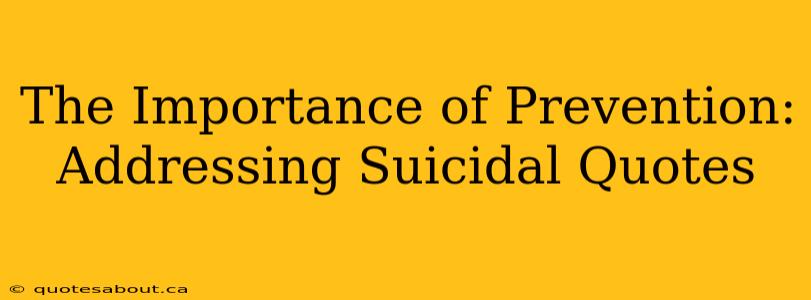Suicidal quotes, whether found online, in literature, or spoken in person, can be incredibly harmful. They normalize suicidal thoughts, romanticize death, and can even trigger suicidal ideation in vulnerable individuals. Understanding the gravity of this issue and implementing preventative measures is crucial for protecting individuals at risk. This article explores the dangers of suicidal quotes and emphasizes the vital importance of prevention and intervention strategies.
Why Are Suicidal Quotes Dangerous?
Suicidal quotes, often shared with the intention of expressing sadness or despair, can inadvertently have devastating consequences. They present a distorted view of suicide, often ignoring the pain and suffering it causes to the individual and their loved ones. For someone already struggling with suicidal thoughts, encountering such quotes can:
- Normalize suicidal ideation: Seeing others express similar feelings can validate their own struggles, making them feel less alone, but also more likely to act on those thoughts.
- Reduce stigma but increase risk: While reducing the stigma around mental health is crucial, the way suicidal quotes are presented can be counterproductive, unintentionally encouraging harmful behavior.
- Trigger suicidal thoughts: Reading or hearing about suicide can trigger a similar response in vulnerable individuals, leading to increased risk.
- Provide a "how-to" guide: Some quotes might indirectly suggest methods of suicide, providing dangerous information to those already contemplating self-harm.
- Romanticize death and suffering: Many suicidal quotes portray death as an escape or a solution, ignoring the long-term consequences and the impact on those left behind.
What Should You Do if You Encounter a Suicidal Quote?
If you encounter a suicidal quote online or offline, it’s important to respond responsibly and with care. Here's what you can do:
- Don't engage or amplify: Avoid liking, sharing, or commenting on posts containing suicidal quotes. This only increases visibility and could unintentionally encourage others.
- Report harmful content: If the quote is on a social media platform, report it to the platform's administrators.
- Reach out to the person: If you know the person who shared the quote, reach out to them directly, offering your support and concern.
- Seek professional help: If you're concerned about someone's safety, encourage them to seek professional help or contact a crisis hotline.
How Can We Prevent the Spread of Suicidal Quotes?
Preventing the spread of suicidal quotes requires a multi-pronged approach:
- Promote mental health awareness: Education and open conversations about mental health can reduce stigma and help individuals seek help when needed.
- Support responsible social media usage: Encourage platforms to improve their content moderation policies and algorithms to identify and remove harmful content.
- Focus on positive messaging: Promote positive and empowering content that emphasizes hope, resilience, and help-seeking behavior.
- Develop strategies for early intervention: Identify and support vulnerable individuals through programs and initiatives that promote help-seeking and crisis intervention.
What Resources Are Available for Individuals Experiencing Suicidal Thoughts?
If you are struggling with suicidal thoughts, please know that you are not alone. There are resources available to help:
- National Suicide Prevention Lifeline (US): 988
- Crisis Text Line (US): Text HOME to 741741
- The Trevor Project (LGBTQ youth): 1-866-488-7386
These are just a few examples, and many other resources exist depending on your location. Remember, seeking help is a sign of strength, not weakness.
How Can We Talk About Suicide in a Healthy Way?
Talking about suicide openly and honestly, without glorifying or romanticizing it, is crucial. We need to focus on:
- Sharing stories of hope and recovery: These narratives can be powerful in reducing stigma and encouraging help-seeking behavior.
- Educating ourselves and others: Learning about suicide prevention, risk factors, and warning signs is crucial for effective intervention.
- Creating safe spaces for conversation: Openly discussing mental health and suicide without judgment is vital to creating supportive communities.
Addressing suicidal quotes requires a collective effort. By understanding the risks, implementing preventative measures, and promoting positive messaging, we can create a safer and more supportive environment for those struggling with suicidal thoughts. Remember, help is always available.

